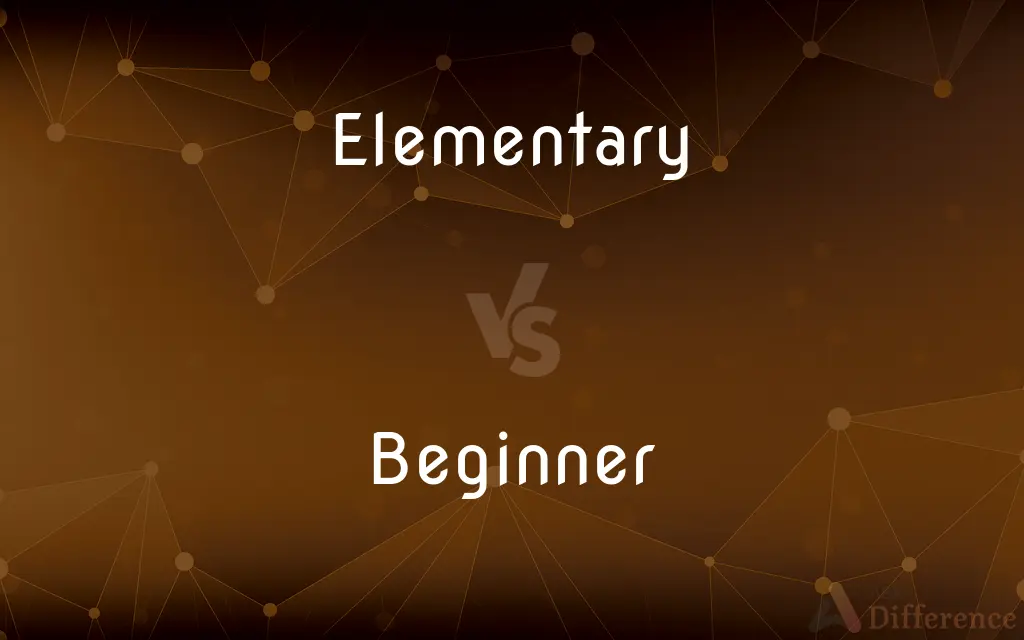Elementary vs. Beginner — What's the Difference?
By Fiza Rafique & Maham Liaqat — Updated on March 12, 2024
Elementary refers to basic, fundamental levels of knowledge or skills, while beginner denotes someone new to a field or activity, starting from scratch.

Difference Between Elementary and Beginner
Table of Contents
ADVERTISEMENT
Key Differences
Elementary is often used to describe the foundational level of education or understanding in a particular subject or skill. It implies a level of knowledge that covers basic principles or concepts, which are essential for further learning or advancement in that field. Beginner, on the other hand, specifically refers to a person who is new to a particular activity or field of study. Being a beginner denotes a lack of experience and familiarity with the subject, and beginners are often in the process of learning the most fundamental aspects of their new pursuit.
While "elementary" can apply to both the level of content and the initial stages of education or learning, "beginner" focuses more on the learner's experience and stage in their learning journey. Elementary knowledge or skills are what beginners typically aim to acquire as they start their learning process.
The transition from beginner to acquiring elementary knowledge or skills represents a crucial phase in the learning process, where foundational concepts are grasped, allowing for further development and progression in the field. This transition underscores the importance of tailored instruction and resources that cater to beginners to ensure a solid understanding of elementary principles.
Despite these differences, in many contexts, the terms may be used interchangeably when referring to the early stages of learning or engagement with a subject. However, recognizing the distinction can help in setting appropriate learning goals and expectations for beginners as they embark on acquiring elementary knowledge or skills.
Comparison Chart
Definition
Relating to basic, fundamental levels of knowledge or skills.
Referring to someone new to a field or activity, starting from scratch.
ADVERTISEMENT
Focus
Basic principles or concepts within a field or activity.
The learner's experience and stage in their learning journey.
Application
Can apply to content, education levels, or learning materials.
Specifically describes the learner's status or level of experience.
Objective
To provide a foundation for further learning and advancement.
To start learning the most fundamental aspects of a new pursuit.
Context
Often used in educational settings to describe initial learning stages.
Used to describe a person at the outset of learning or trying something new.
Compare with Definitions
Elementary
Basic level of understanding or skills.
His knowledge of French is elementary, covering greetings and common phrases.
Beginner
Someone new to a particular activity or field.
As a beginner in yoga, she is still learning the basic poses.
Elementary
Pertaining to basic principles or fundamentals.
Elementary mathematics includes addition, subtraction, multiplication, and division.
Beginner
Requires introductory level instruction or resources.
The workshop is designed for beginners, requiring no prior knowledge of the subject.
Elementary
Foundational level in education or learning.
Elementary science classes introduce students to basic concepts like the water cycle and plant photosynthesis.
Beginner
Lacks experience in a specific area.
He's a beginner at chess, just learning the movements of the pieces.
Elementary
Essential for further advancement in a field.
Elementary coding skills are crucial for anyone looking to pursue a career in software development.
Beginner
At the start of the learning process.
Beginner language learners often start with simple vocabulary and phrases.
Elementary
Often associated with initial stages of education.
Elementary education lays the groundwork for lifelong learning and critical thinking.
Beginner
Focus on learning fundamental aspects or skills.
The beginner's course covers the basics of digital photography, including using a camera and composing shots.
Elementary
Of, relating to, or constituting the basic, essential, or fundamental part
An elementary need for love and nurturing.
Beginner
A person just starting to learn a skill or take part in an activity
A beginner's guide
An absolute beginner
Language courses for beginners
Elementary
Of, relating to, or involving the fundamental or simplest aspects of a subject
An elementary problem in statistics.
Beginner
One that begins.
Elementary
Of or relating to an elementary school or elementary education
The elementary grades.
Elementary teachers.
Beginner
One who is just starting to learn or do something; a novice.
Elementary
Relating to the basic, essential or fundamental part of something.
Beginner
Someone who is just starting at something, or has only recently started.
I'm new to learning Finnish: I'm just a beginner.
Elementary
Relating to an elementary school.
Beginner
Someone who sets something in motion.
The beginner of the games lit the ceremonial torch.
Elementary
(physics) Relating to a subatomic particle.
Beginner
(theatre) An actor who is present on stage in the first moments of a play.
Elementary
(archaic) Sublunary; not celestial; belonging to the sublunary sphere, to which the four classical elements (earth, air, fire and water) were confined; composed of or pertaining to these four elements.
Beginner
One who begins or originates anything. Specifically: A young or inexperienced practitioner or student; a tyro.
A sermon of a new beginner.
Elementary
An elementary school
Beginner
Someone new to a field or activity
Elementary
A supernatural being which is associated with the elements.
Beginner
A person who founds or establishes some institution;
George Washington is the father of his country
Elementary
Having only one principle or constituent part; consisting of a single element; simple; uncompounded; as, an elementary substance.
Elementary
Pertaining to, or treating of, the elements, rudiments, or first principles of anything; initial; rudimental; introductory; as, an elementary treatise.
Elementary
Pertaining to one of the four elements, air, water, earth, fire.
Elementary
Easy and not involved or complicated;
An elementary problem in statistics
Elementary, my dear Watson
A simple game
Found an uncomplicated solution to the problem
Elementary
Of or being the essential or basic part;
An elementary need for love and nurturing
Common Curiosities
How do educators differentiate instruction for beginners and those at an elementary level?
Instruction for beginners often focuses on engagement and familiarization with the subject, while elementary level instruction builds on this foundation with more structured learning of basic principles.
Can someone be at an elementary level without being a beginner?
Yes, someone might not be a beginner if they have some familiarity or prior exposure to a subject, but they could still be at an elementary level in terms of their depth of knowledge or skill.
Can a beginner skip elementary concepts and advance quickly?
While some beginners may progress quickly, understanding elementary concepts is crucial for a solid foundation and future advancement.
Can someone be considered a beginner in one aspect of a field but not in others?
Yes, someone might be a beginner in one area of a field (e.g., a particular technique or concept) while having more advanced knowledge in other areas.
Is elementary knowledge enough to be proficient in a field?
Elementary knowledge provides a foundation, but proficiency typically requires more advanced understanding and skills beyond the elementary level.
Can advanced learners benefit from revisiting elementary concepts?
Yes, revisiting elementary concepts can reinforce foundational knowledge, clarify understanding, and enhance advanced learning.
Does being a beginner imply a lack of skill?
Being a beginner implies being at the earliest stage of learning, where one is acquiring initial skills and knowledge, rather than lacking skill altogether.
Is it common for people to revert to beginner status when learning something new within their field?
Yes, learning a new skill or concept within a familiar field can place an individual in a beginner status in that specific area, even if they are more advanced overall.
How long does it typically take for a beginner to reach an elementary level?
The time it takes can vary widely depending on the individual, the complexity of the subject, and the intensity of study or practice.
Are there resources specifically designed for beginners and elementary learners?
Yes, there are many resources tailored to beginners and elementary learners, designed to introduce fundamental concepts and skills in an accessible manner.
Share Your Discovery

Previous Comparison
Multicultural vs. Multiethnic
Next Comparison
Gestapo vs. SSAuthor Spotlight
Written by
Fiza RafiqueFiza Rafique is a skilled content writer at AskDifference.com, where she meticulously refines and enhances written pieces. Drawing from her vast editorial expertise, Fiza ensures clarity, accuracy, and precision in every article. Passionate about language, she continually seeks to elevate the quality of content for readers worldwide.
Co-written by
Maham Liaqat














































